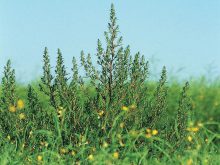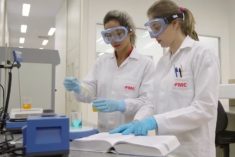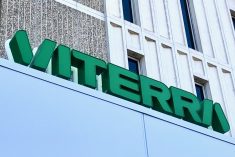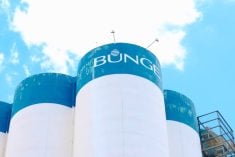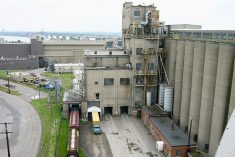Competition for the Prairie farmer’s crop protection dollar will survive following the planned merger of chemical giants Dow and DuPont, by way of a handful of asset sales, Canada’s Competition Bureau has ruled.
The federal antitrust watchdog on Tuesday announced it has an agreement with DuPont and Dow Chemical to head off what would otherwise be “a substantial lessening or prevention of competition” in the Prairie crop protection market.
That means a new owner for DuPont’s Canadian cereal crop broadleaf and pre-seed burnoff herbicide portfolio; the company’s PrecisionPac herbicide dispensing system; its experimental farm at Hanley, Sask., about 55 km south of Saskatoon; and its packaging plant in Calgary.
Read Also

India slaps 30 per cent import duty on yellow peas
India has imposed a 30 per cent duty on yellow pea imports with a bill of lading date on or after Nov. 1, 2025.
Those assets, as per the bureau’s agreement, are to be sold to Philadelphia-based chemical company FMC Corp., which already has market space in both Western and Eastern Canada with various herbicide, insecticide and fungicide brands such as Authority, Command, Focus, Pounce and Rovral.
Outside Canada, FMC will also get DuPont’s crop chemical manufacturing plant at Manati in Puerto Rico and its Stine facility at Newark, Delaware, home to DuPont’s “primary herbicide discovery and development efforts for Canadian markets,” the bureau said.
DuPont and FMC had already arranged an asset swap for these DuPont crop protection assets, among others, back in March, following a ruling from European Union regulators for approval of the Dow/DuPont merger. In exchange, DuPont gets the FMC Health and Nutrition business plus US$1.2 billion.
Its deal with DuPont will see FMC’s agricultural business become the world’s fifth-biggest crop protection chemical company by revenue.
Dow and DuPont’s deal with the Competition Bureau will also see Dow sell its global business of ethylene acrylic acid copolymers and ionomers — plastics used in packaging for food, beverages and pharmaceuticals — to SK Global Chemical Co.
Seoul-based SK Global, a petrochemical processor owned by Korea’s SK Group, is “a new entrant” in those markets, the bureau said Tuesday.
The bureau’s review found both FMC and SK Global are “acceptable buyers, as they are likely to compete effectively and support innovation in the sector in Canada.”
“Loss of rivalry”
The bureau said Tuesday its concerns over a Dow/DuPont merger related to the “loss of rivalry between the parties” in broadleaf herbicides for cereal crops and in pre-seed burnoff additives for cereal crops, plus the specialized markets for acid copolymers and ionomers.
In the broadleaf herbicide business, the bureau said its review showed Dow and DuPont are two of the three “principal suppliers,” along with Bayer, of the cereal broadleaf herbicides Prairie farmers use.
“Given the closeness of competition between their products, the bureau determined that the merger of the parties’ portfolios would likely negatively impact competition,” the bureau said, adding those impacts “were unlikely to be effectively constrained by the entry or expansion of new or existing competitors.”
Also, the bureau said, both Dow and DuPont have “innovation efforts directed at expanding and enhancing their respective cereal broadleaf herbicide portfolios.”
Thus, in a merger, “the loss of innovation rivalry would reduce the incentive to innovate and to bring new and more effective products to market in a timely manner.”
Meanwhile in the pre-seed burnoff market, Dow and DuPont, with their PrePass and Express product lines respectively, are “the two leading suppliers of additives for pre-seed burnoff in cereal crops and are long-time rivals,” the bureau said.
Losing that rivalry to a merger “would likely result in higher prices for farmers, leading some to adopt less effective weed management strategies” — and again, without an asset sale, market entry or expansion by “current or future competitors” wouldn’t offset those problems.
“The agreement reached today ensures that consumers and businesses continue to benefit from a dynamic marketplace which offers innovative solutions, increased choice and competitive prices,” John Pecman, Canada’s commissioner of competition, said Tuesday in a release.
Once completed, Dow and DuPont’s merger deal calls for the combined firm to split into three companies: material sciences, specialty products, and seeds/crop protection.
Their US$130 billion all-stock merger has already picked up antitrust approvals in most markets where the companies operate, including the U.S., China, Mexico and Brazil along with the EU. — AGCanada.com Network



